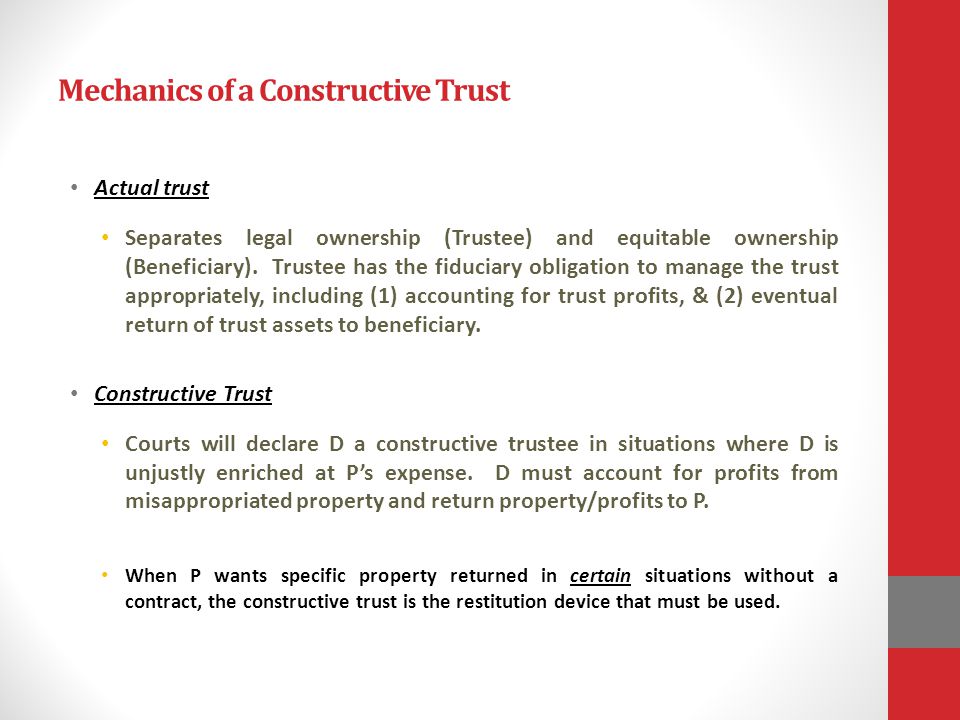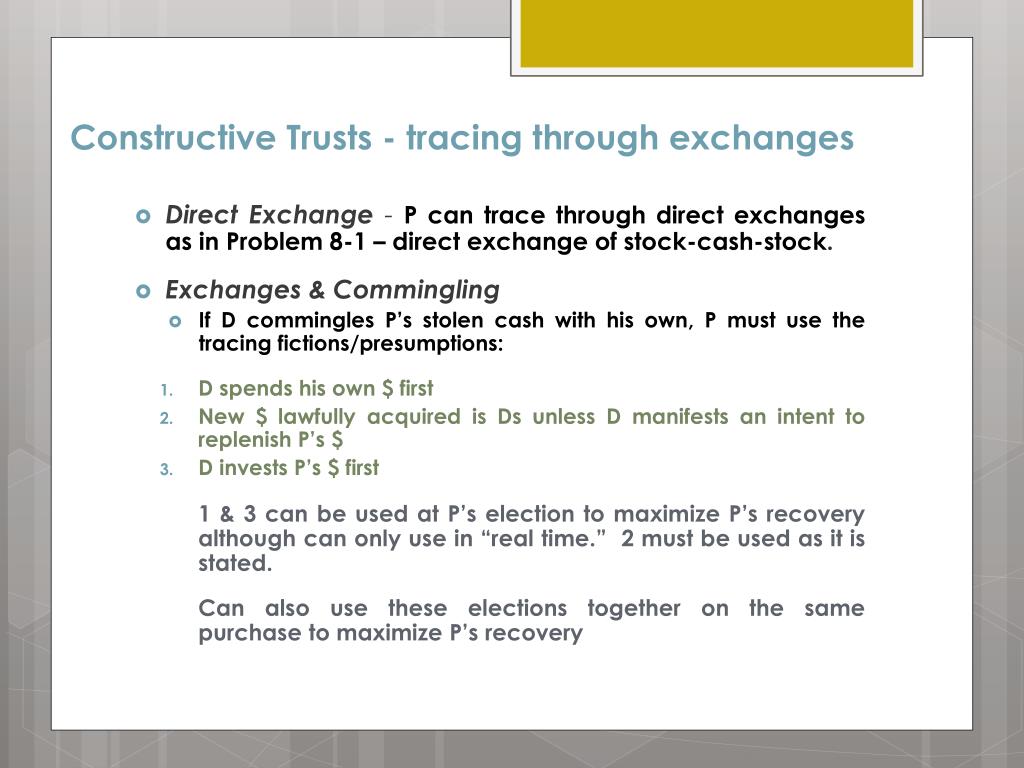Lawyer’s View Surrounding What Is A Constructive Trust Discussed
Lawyer’s View Surrounding What Is A Constructive Trust Discussed
Blog Article
Revealing the Benefits of a Positive Rely On Handling Beneficiary Problems
The concept of a useful trust fund arises as a critical tool in the complex realm of beneficiary disputes, providing a nuanced option to disagreements that usually emerge from wrongful residential or commercial property retention. By cultivating a fiduciary relationship in between celebrations, this fair treatment not just facilitates swift resolutions yet likewise serves to discourage prospective misconduct. As we discover the complex benefits of positive trusts, one may start to question how these mechanisms can improve the landscape of estate conflicts and contribute to a more equitable distribution of assets among recipients.
Meaning of Constructive Trust Fund
A positive depend on is regularly developed by courts to attend to situations where one celebration has actually wrongfully acquired or retained home that rightfully comes from one more (What Is A Constructive Trust). This legal idea is not a typical trust fund, as it does not need the procedures commonly connected with trust creation, such as a composed contract or the purpose of the celebrations involved. Instead, a constructive trust fund develops by operation of regulation, serving as an equitable treatment to protect against unjustified enrichment
The courts impose a positive trust fund when it is identified that one party holds residential property under situations that, in equity and good conscience, ought to not permit them to maintain it. Usual circumstances include deceitful actions, breaches of fiduciary duty, or circumstances where a party has actually acquired residential or commercial property with inappropriate ways. The positive trust fund hence operates to protect the civil liberties of the rightful owner by guaranteeing that the property is held for their advantage.
Once developed, the constructive trust needs the celebration in belongings of the home to share it to the rightful owner, hence remedying the wrongful situation. This mechanism underscores the lawful system's dedication to justness and justice in property disputes, highlighting the value of ethical conduct in possession and transfer of assets.
Advantages of Useful Trust Funds
Useful depends on use a number of significant advantages in lawful disagreements involving property rights. Primarily, they offer as a fair solution, enabling courts to deal with scenarios where a party has wrongfully obtained or maintained building that truly belongs to one more. This establishes a framework for justness, making certain that the rightful proprietor is made up and the unfair enrichment of the crook is cut.
Moreover, constructive depends on can speed up resolution in conflicts over estate properties, thus decreasing the frequently contentious and lengthy lawsuits processes connected with standard home conflicts. Their flexibility allows courts to customize treatments to fit the details conditions of each instance, which can lead to even more adequate outcomes for all celebrations involved.
Furthermore, constructive trusts promote openness and liability among beneficiaries and fiduciaries, as they require the last to act in the most effective passions of the previous. This reinforces the honesty of fiduciary relationships, cultivating depend on and cooperation. Lastly, by inhibiting misconduct related to home ownership, positive depends on contribute to the general security of economic and legal systems, making certain that property legal rights are valued and maintained within society.
Just How Constructive Depends On Job

In practice, when a useful trust fund is enforced, the court recognizes the property in inquiry and establishes a fiduciary connection between the events entailed. The celebration that holds the home becomes a more info here trustee, obliged to manage it for the advantage of the rightful proprietor, called the recipient. This connection is not based upon an official agreement yet rather on the concept of equity, intending to fix situations where one party's gain straight correlates with an additional's loss.

Situation Studies and Examples
When analyzing the useful application of useful counts on, various study highlight exactly how courts browse intricate situations involving unfair enrichment. One notable situation is * Pettkus v. Becker *, where the Supreme Court of copyright developed a positive depend correct the unjustified enrichment of one celebration over another in a long-term partnership. The court identified that the payments of one partner to the procurement of home warranted the charge of a constructive trust fund, making certain equitable distribution.
An additional significant example is * Gisborne v. Gisborne *, where the court enforced a positive trust fund to read this post here deal with the claims of brother or sisters over their departed brother's estate. The court acknowledged the payments made by the brother or sisters in maintaining the family members building, bring about a choice that needed the estate to make up those contributions, thus protecting against unjust enrichment.
These cases exemplify how positive trusts can efficiently deal with disagreements by concentrating on justness and the prevention of unjustified enrichment. By analyzing the details payments and conditions of the parties included, courts can apply constructive trust funds to achieve simply end results, inevitably reinforcing the fair concepts underpinning these legal systems.

Steps to Develop a Useful Count On
To establish a positive trust, several crucial steps must be complied with to guarantee that the claim is confirmed and legally recognized. First, the claimant should show the presence of a fiduciary connection or a situation that necessitates the imposition of a constructive count on, such as scams, unjustified enrichment, or a breach of task.
2nd, it is crucial to gather and present engaging proof that supports the claim. This includes documentation and testaments that show the scenarios resulting in the claimed wrongful retention of residential or commercial property or benefits by the trustee.
Third, the here claimant ought to file a petition in the appropriate court, verbalizing the grounds for asking for the charge of a constructive count on. This request has to lay out the specifics of the connection and the unfair enrichment that requires the trust fund.
Conclusion
To conclude, positive trusts stand for a critical fair remedy in the realm of beneficiary conflicts, efficiently attending to wrongful residential or commercial property retention and protecting against unjustified enrichment. By creating a fiduciary relationship, these counts on improve openness and responsibility among property holders. The expedited resolution of estate disagreements and the frustration of misbehavior add to greater security within legal and economic systems. Eventually, positive depends on promote fairness amongst recipients, guaranteeing that rightful possession is maintained and safeguarded.
A constructive trust is regularly developed by courts to deal with circumstances where one party has wrongfully gotten or retained residential or commercial property that rightfully belongs to another.The courts enforce a useful trust when it is determined that one party holds residential property under circumstances that, in equity and excellent principles, ought to not permit them to retain it. By dissuading misbehavior relevant to property ownership, constructive depends on add to the general stability of economic and lawful systems, ensuring that home rights are appreciated and supported within culture.
In practice, when a useful trust is enforced, the court recognizes the residential property in inquiry and establishes a fiduciary relationship in between the events involved. What Is A Constructive Trust. The court determined that the contributions of one companion to the purchase of residential or commercial property warranted the charge of a useful depend on, ensuring fair distribution
Report this page